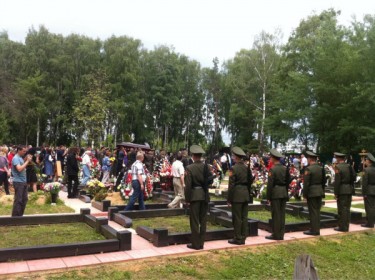The June 10, 2011, assassination of Yuri Budanov [1], the former Russian army colonel convicted of the murder of an 18-year-old Chechen woman [2] during the Second Chechen War [3], has reignited inter-ethnic tensions both online and offline, and reinforced the feeling of bitter disappointment with what appears to be a permanent state of lawlessness in the country.
Moscow-based journalist Miriam Elder has described [4] Budanov's case as “the single loudest legal case to emerge from the Chechen wars, when Russian troops were accused of widespread human rights abuses as they attempted to put down a separatist insurgency.” Below is her summary:
[…] Budanov was convicted in 2003 of murdering Heda Kungayeva, an 18-year-old Chechen woman. He maintained that he thought she was a rebel sniper when he took her in for questioning in 2000. Initial forensic examinations found evidence of torture and rape.
His case took many twists and turns, with the charges repeatedly reformulated. He was one of very few Russian soldiers taken to court for human rights abuses and many critics said the fierce attention paid to his case allowed the government to let further investigations fall by the wayside. He was released on parole in 2009 [5], after serving nine years of his 10-year sentence, sparking protests in Chechnya. Yet to Russia’s active nationalists, Budanov was held up as a hero.
While Budanov's case has been a cause célèbre for Russian nationalists throughout the past decade, his murder is currently being discussed in every ideological corner of the Russian blogosphere.
Looking for culprits
Right after the assassination, many bloggers began pointing at the Chechen President Ramzan Kadyrov [7] as the figure likely to be behind the crime.
Alexey Navalny, a popular Russian anti-corruption activist [8], who is also known for his nationalist stance [9], wrote this [10] [ru]:
[…] Есть все основания полагать, что эта казнь была прямо или косвенно организована той бандитской группой, которую сейчас принято называть “руководство Чеченской республики”.
По крайней мере, Р. Кадыров ранее прямо и публично заявлял о намерениях осуществить такую казнь: “мы найдем возможность воздать ему по заслугам [11]” […]
At least, [Ramzan] Kadyrov had earlier made direct and public announcements of the intentions to carry out such an execution: “we will find an opportunity to get him what he deserves [11] [ru].” […]
Blogger efa2007, came up with a more general explanation [12] [ru]:
виноват тот, кто сделал все от себя зависящее, что бы эта ситуация состоялась, что бы конфликт становился все более и более межнациональным, кто манипулирует людьми как фигурками на шахматной доске сидя на вершине выстроенной им вертикали. В ней мы все заложники – и русские и чеченцы, и военные и мирные граждане, и бандиты и честные люди – всех держит намеренно на крючке банда бывших КГБ-шников, захвативших страну – это их единственный способ управления людьми, они по-другому просто не умеют и ситуация избирательности выгодна им – бояться должны все.
The semi-official version that Budanov could have been killed by the nationalists – who consider him as somewhat of an icon – was uniformly rejected by the Russian bloggers.
Who gets impunity?
As in any other war narrative, a significant part of the discussion focuses on whether Budanov should be perceived as a hero or a war criminal.
The question of photoblogger aleshru – “Please tell me, why Budanov is considered a hero? I really want to know” – has generated nearly 420 replies. In addition to the usual justification that Budanov killed Kungayeva because he thought she was a sniper, blogger max_kozhevnikov wrote [13] [ru] about an episode when Budanov's actions helped save the lives of 160 soldiers (the award he received for this was recalled after Budanov was found guilty of Kungayeva's murder).
The Chechen perspective on Budanov is quite different, however. Vainakh's Veras, a North Caucasian Vkontakte.ru group with over 8,000 members, used [14] [ru] the following language to summarize the significance of what happened on June 10:
Буданов был символом насилия в Чечне,угнетения и покорения Чечни! Да ,сам по себе он всего 0.00001 % от тех кто заслуживает отомщения за геноцид в Чечне. Но его смерть – это идеологическая победа над всей зверствовавшей российской армией! СЕГОДНЯ БЫЛО УБИТО ЧУВСТВО БЕ3НАКАЗАННОСТИ РОССИЙСКОЙ ВОЕНЩИНЫ! запомни,Кавказ!
Russian nationalists, on the other hand, believe that it is the Chechen separatists who enjoy impunity. Nationalist blogger kon-budennogo wrote [15] [ru]:
Проблема в том, что при Путине у нас судят только Будановых, Ульманов и Аракчеевых, а если стороне, против которой их послало воевать государство, его приговоры не нравятся, то их еще и убивают. Где суды против бандитов, державших русских рабов в Чечне? Они где-то проходят? […] Где суды против убийц русских стариков? Против тех, кто держал заложников? В нашем государстве подобные суды невозможно даже представить.
utnapishtim2008 commented [18] [ru] on the question of whether there had been convicted war criminals on the Chechen side:
Их там полно, просто потом перестали пленять – местные присяжные оправдывают, мочат и все тут.
In a long post on war crimes, ethnicity and an officer's honor, LJ user colonelcassad concluded [19] [ru]:
Моя позиция проста – наши предки смогли оказаться выше чувства мести, можем и мы. Не месть нужна, а суд – беспристрастный и неотвратимый. Именно отсутствие неотвратимости государственного возмездия вызывает к жизни фрагментарные призывы к мести, как орудия справедливости.
